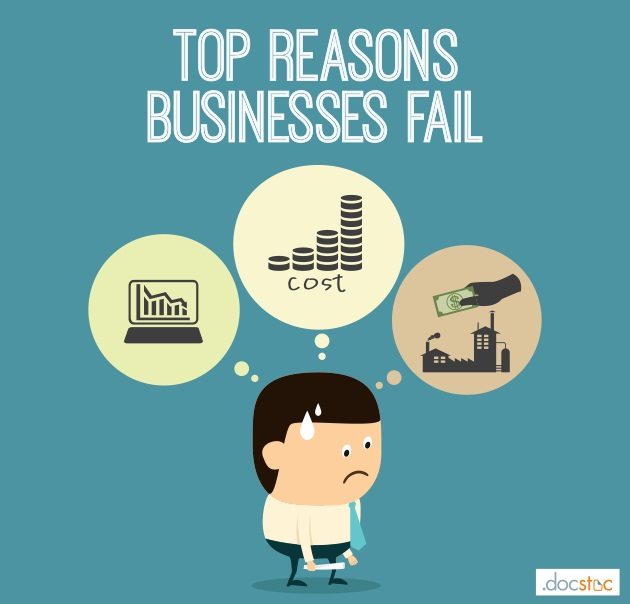
Failure among startups is unfortunately extremely common. According to the Small Business Administration, over 50% of startup businesses fail in the first five years of operation. Some of these failures are due to bad luck or a sour economy, but others happen because people aren’t aware of where they are going wrong and continually fail to look at their own shortcomings.
Before you invest a lot of time, money and resources into entrepreneurship, familiarize yourself with this list of common reasons that businesses fail. Understanding these pitfalls will help you know what to avoid and how to fix small issues before they become bigger problems.
1. Lack of experience.
Have you ever managed teams or delegated tasks? Do you have experience in your industry? A smooth and successful operation requires thorough knowledge of the industry, business experience and management skills. Many first-time owners lack leadership skills and the ability to communicate their ideas to others. Good ideas need good execution, knowledge of the market and a leader who can effectively share the company vision with their employees. Leaders should not only be able to communicate, but they should also inspire employees while maintaining their respect.
How to Prevent:
Gain the necessary skills through training and personal development classes—ideally before you start your business. Leadership skills, client relations, basic business tactics and management skills can all be gained through the right research and practice. Also consider reading books by influential CEOs and meeting with other business leaders to ask for advice.
2. No clear and formulated plan or mission.
While this may seem simple, it is vital to outline exactly what your vision is for your business and how you will reach your goals. What product or service will you provide? What are your objectives, and how will attain them? Customers also need to be able to clearly understand who you are, what you do and why you are valuable to them. You must be concise and compelling. Can’t explain your business in a minute? You may need to work on your business plan.
How to Prevent:
Draft a complete business plan, and validate your business idea before you get started. This will make it easier for you to answer questions and explain your business to others throughout your journey. Also be prepared with adequate communication skills and strategies. This will help you easily communicate your ideas and your mission with customers, investors, employees and other important individuals.
3. Not understanding customer needs.
You may have a great idea for a product, but without a real, productive dialogue with potential customers, you may miss important details about what they really need. If you wait too long to ask questions, you may sink a lot of time and money into an approach that ends up being wrong
How to Prevent:
Start a conversation early in the process, and genuinely listen to feedback. Be willing to make changes to your business or product in response to this feedback (this is considered the Agile Methodology). Conduct surveys, host focus groups, ask questions on social media and talk to people in person to see how you are doing and how you can improve. Make sure that plenty of people (who represent your target market) try your product hands-on, and be sure that they tell you specifically which features they like and which would be most useful to them. Tip: Sometimes customers don’t know what they want, and it’s up to you figure it out. If you are building a product or a solution to a customer’s needs, consider shadowing them so you can search for needs they might not have mentioned.
4. Unable to manage costs.
All businesses start with a limited amount of capital and will eventually run out of cash. Although you may have enough money for initial startup costs, it’s easy to forget how much time it takes to pay back your initial expenses, let alone turn a profit. You must be able to support yourself financially for at least six months and be prepared to fund your business through tough times. It’s up to you to determine when your financial breaking point is and how you will start making revenue before then.
How to Prevent:
Learn how to raise sufficient capital with investors and other types of funding. Run tests (through tools like landing pages) to prove whether or not you will be able to make money before you build out an entire product. Offer up your product to a sample group, and find out if you have something people will pay for. Also remember to save up a large cash reserve to get you through the tough times.
5. Not having a unique value proposition.
You need to be valuable and offer something unique to your customers to be successful. If you are too similar to other businesses already active in the market, then you will have to spend too much time competing rather than innovating and expanding your business. If the market size is large enough, it’s okay to provide a similar product or service as competitors, but it’s critical that you take a unique approach.
How to Prevent:
First, take a look at your market size and competition; how many target customers are there, and who is already reaching them? Once you’ve completed your market research, it’s important to determine how you will differentiate yourself from your competitors. Will your prices be cheaper? Will you target a specific niche, such as 18- to 25-year-olds or businesses with under 10 employees? Before diving into a business, make sure there is a market for your product and, if there is a lot of competition, that you can take a unique approach to marketing it.
6. Not prepared for the unexpected.
Entrepreneurs risk losing their business a lot of time and money when they react to problems instead of anticipating them. Unexpected issues will inevitably arise, like a natural disaster, an economic downturn or shifts in spending. While many of these issues cannot be prevented, it’s the responsibility of the business owner to consider them beforehand.
How to Prevent:
Purchase insurance for unexpected emergencies, accidents or natural disasters to prevent you from having to foot the entire bill if something goes wrong (see a full guide to business insurance here). Be prepared with a backup cash reserve, and be ready to pivot your business if the market shifts. Make sure that your business remains legally compliant in all of its activities (for example, onboard employees properly, and never violate another company’s intellectual property); there is no reason to get caught up in an expensive legal battle that could have been avoided.
7. No clear marketing plan.
Don’t assume people will come to you just because you have a product or service that people need. Even if you believe your product is amazing, you should never rely on viral or word-of-mouth success. You need referrals, leads, advertising and other marketing methods to get customers’ attention. People won’t become patrons of your business if they don’t know you exist.
How to Prevent:
Come up with an effective marketing plan for your business and your customers. Consider online advertisements (through services like Google AdWords or Facebook), newspaper or print advertisements, social media and email marketing. Don’t be afraid to be bold: the point of marketing (especially when you’re first starting out) is to grab attention.
8. No follow-up with customers.
This includes potential leads who show an interest and those who have already bought from you. Repeat business is vital to the success of your company. Entrepreneurs often fail at retaining customers and let inquirers slip through their fingertips. If someone arrives on your website, asks a question about your product or purchases one of your services, you must keep in touch if you want to keep their business.
How to Prevent:
Build an email list to promote newsletters, discounts and products that customers previously purchased or added to their carts. If a potential customer lands on your website, consider remarketing through AdWords to track the lead with advertisements as he or she moves across the web; this keeps you fresh in the customer’s mind. Remember that consumers who have already expressed interest in your business are the easiest market to penetrate.
9. Inefficient operations and overspending.
The costs of a startup are high: labor, office space, materials, marketing, hiring, research and more. It may also be tempting to purchase things that make you look and feel professional and successful. However, jumping the gun on purchases is one quick way to bankruptcy.
How to Prevent:
Learn to negotiate costs and budget. Costs with many service providers are not always set in stone, so try to negotiate to get the best materials and labor for your budget. If you can’t afford a stellar employee that you absolutely need, consider offering equity in place of a higher salary. List the expenses you want, and then highlight the requirements, but hold off on items that aren’t vital to your survival. Do you really need an office space in your first few months? Or do you want one to feel professional? Remember, the more expenses you save, the more you can reinvest in your business.
Aspiring entrepreneurs shouldn’t be scared by the statistics and the potential problems. Just be prepared for the challenges, and prevent the issues that you can. The advantages of owning and operating your own business may outweigh the risks as long as you do your homework. Be ready to take on the problems, and you and your business can succeed.
About The Author – Jason Nazar
 Jason Nazar is the Co-Founder & CEO of Docstoc.com, which provides the best quality and widest selection of documents & resources to start & grow small businesses.
Jason Nazar is the Co-Founder & CEO of Docstoc.com, which provides the best quality and widest selection of documents & resources to start & grow small businesses.


























